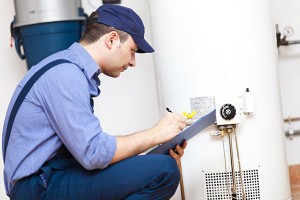

Since many people will stay in a home far longer than eight to fifteen years, it can help to find ways to increase the longevity of your water heater. The good news is that there are a few things you can do, or have your plumbing contractor do for you, which could increase the life of your heater by several years. Naturally ensuring that you properly maintain it is one of those key ingredients to successfully elongating the life of your heater. Here are a few of those steps.
The anode rod is a rod made of magnesium or aluminum. The purpose of this rod is to act as a sacrificial device in order to save your tank. Since the major cause of a tanks deterioration and loss of efficiency is corrosion, an anode rod serves to attract the galvanic corrosion to itself and thereby works to save the tank from corrosive elements. Having a plumbing contractor install a second anode rod can increase the life of your tank.
Cleaning or flushing out the tank at least once per year can also help to greatly increase the life cycle of your water heater. Most plumbing contractors will tell you that a sure way, to improve the efficiency of your water heater, is to remove the excessive sediment that builds up by flushing the system. Luckily most new models have a self-cleaning option, but you should still consider flushing the system at least once a year.
An expansion tank is an ideal way to greatly increase the life of your water heater. A water heater works by heating up and storing hot water, and usually the system will have a prevention valve that does not allow the water to get back into the mains. When water is heated from 50 to 120 degrees it undergoes expansion, and since water is not compressible this puts a great deal of pressure on the water heater itself. It also put pressure on your plumbing and is the reason why you will often experience a spurt of increased pressure when taking a hot shower. Installing an expansion tank gives the water a place to go so that it does not put pressure on the tank, and this can help to improve your water heaters life cycle. The less pressure you put on the tank, the longer it will last. It is always recommended that you schedule a consultation to discuss an expansion tank and if this is a good option for your household.
Related Posts
Why choose us?


